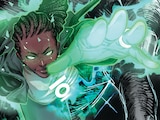There have been plenty of amazing women in the history of comics. In fact, some of the most important and impactful writers, editors, artists, letterers and colorists from the past 100+ years were women. But how many were also four-time U.S. Open winners and 18-time Grand Slam tennis champions, as well as Nazi-fighting spies who almost died in their attempts to take down fascism?
Just one, and her name was Alice Marble.
Marble was born and raised in California, and just like a certain young Amazonian princess, Alice excelled in many athletic pursuits and sports, but it was in tennis that she would find a career. By her teens, she'd won multiple state championships, and at the age of 23, she won her first U.S. Singles championship. Marble went on to win an unbelievable eighteen Grand Slams: five in Singles, six in Women's Doubles, and seven in Mixed Doubles including multiple wins at Wimbledon and the U.S. National Championships. In 1939, she was ranked as the number one tennis player in the world and retired from professional competition only a year later.

In the early days of World War II, Marble was approached to be an athlete endorser of the then quite new Wonder Woman comic book. Instead, Marble became an associate editor of the popular series in its earliest days while William Moulton Marston and Harry G. Peter were still helming the title. During her time on the book, Marble created “Wonder Women of History,” an ongoing feature which highlighted brilliant and inspiring women throughout history who she felt embodied the same ideals as Wonder Woman—empowerment, justice, peace and compassion.
“Wonder Women of History” ran for twelve years beginning in the very first issue of Wonder Woman, with Marble personally credited until Wonder Woman #17. Each story was told from the perspective of the titular heroine Diana, and she even signed her name at the end of every tale. “Wonder Women of History” included entries on many vital and often ignored women, from Sojourner Truth to Clara Barton to Kit Coleman to Anna Pavlova, celebrating women's achievements from the political to cultural. The stories also ran in many installments of Sensation Comics.
The last comic book to include “Wonder Women of History” was Wonder Woman #66 in 1954. Strangely, the feature was replaced by a series of shorts offering tips about beauty or how to get married, though a later sporadic series of backups on many topics prefaced by "Women of" was more reminiscent of Marble's creation.

Another thing that Marble shared with Wonder Woman—and many of us—was that she persevered through devastating personal tragedy. In 1944, her husband died after his plane was shot down during WWII, and she was delivered this news shortly after a car crash that led to her having a miscarriage. However, less than a year later Marble was recruited to participate in an espionage plot for the U.S. Army which saw her attempt to gain financial information regarding the Nazis. Sadly and quite frighteningly, her career as a spy was cut short when a Nazi soldier shot her in the back during a reconnaissance mission.
After she recovered from her injuries, Marble returned to tennis, playing exhibition matches and training Billie Jean King, who would ironically go on to beat Marble's 1939 Wimbledon Doubles partner Bobby Riggs in the now infamous Battle of the Sexes. Marble also became an advocate for integration in tennis, writing a historic editorial in American Tennis Magazine that scathingly criticized the all-white U.S. Lawn Tennis Association for their racist policy of excluding African-Americans from competition.
Marble wrote: "Miss Gibson is over a very cunningly wrought barrel, and I can only hope to loosen a few of its staves with one lone opinion. If tennis is a game for ladies and gentlemen, it's also time we acted a little more like gentle-people and less like sanctimonious hypocrites... If Althea Gibson represents a challenge to the present crop of women players, it's only fair that they should meet that challenge on the courts."

She also stated that if Gibson wasn't allowed to compete then "there is an ineradicable mark against a game to which I have devoted most of my life, and I would be bitterly ashamed."
After the publication of Marble's piece, Gibson was rightfully invited to play in the 1950 U.S. Championships, becoming the first African-American tennis player to ever compete in a Grand Slam. A great and impactful example of Marble's belief in the importance of equality and speaking out against social wrongs, this was one of her final public acts before she retired to Palm Springs, where she lived peacefully teaching tennis until her death in 1990.
Rosie Knight writes about comics, movies and TV for DCComics.com, Nerdist, IGN and The Hollywood Reporter.




















